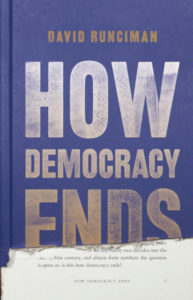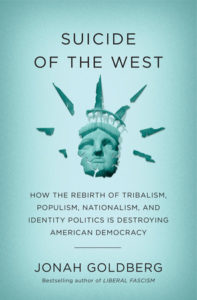 …… as Cambridge political theorist and conservative pundit Jonah Goldberg’s Suicide of the West suggest, asks Timothy Shenk, a postdoctoral fellow at Washington University in St. Louis, a Carnegie Fellow at New America, and an editor at Dissent. When a representative democracy thrives, it does so by offering enough benefits to citizens that they are willing to overlook the system’s inevitable frustrations, Shenk writes for The New Republic:
…… as Cambridge political theorist and conservative pundit Jonah Goldberg’s Suicide of the West suggest, asks Timothy Shenk, a postdoctoral fellow at Washington University in St. Louis, a Carnegie Fellow at New America, and an editor at Dissent. When a representative democracy thrives, it does so by offering enough benefits to citizens that they are willing to overlook the system’s inevitable frustrations, Shenk writes for The New Republic:
Following Fukuyama, Runciman emphasizes that the rewards are both material and intangible. Higher living standards and the recognition that comes from having your vote counted are an appealing combination. Fail to deliver on either front, however, and compromise starts to look like betrayal. Fail on both counts, and the prospect of abandoning democracy becomes increasingly attractive….
 Goldberg places the blame for democracy’s most recent attempt to “take these things away” squarely on the left, but adds that liberal capitalism is not necessarily democratic, Shenk adds:
Goldberg places the blame for democracy’s most recent attempt to “take these things away” squarely on the left, but adds that liberal capitalism is not necessarily democratic, Shenk adds:
Historically, the two were more likely to be seen as antagonists than allies….. “I’m in the camp,” he wrote for National Review in 2006, “which holds that liberalism is more important than democracy…. I mean liberalism in the classical or philosophical sense: rule of law, individual liberty, free markets, free expression, etc., etc. Lost on many people is the fact that these things don’t necessarily come with democracy. Indeed, democracy can often take these things away.”
But, as political theorist Corey Robin has observed, when an old order is collapsing…it is easy to confuse the waning of a particular political system with a more fundamental breakdown of democracy, Shenk adds, holding out the prospect of democratic renewal.







